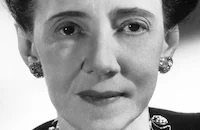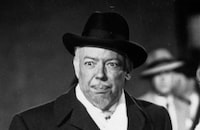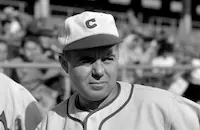Song of Surrender
Cast & Crew
Mitchell Leisen
Claude Rains
Macdonald Carey
Wanda Hendrix
Andrea King
Henry Hull
Film Details
Technical Specs

Synopsis
In 1906, in a small New England town, Abby, the young wife of a middle-aged, Puritanical Civil War historian and museum curator, Elisha Hunt, meets New York lawyer Bruce Eldridge. Bruce is engaged to a beautiful, wealthy widow named Phyllis Cantwell, who has recently bought a house up the hill from the Hunts. Although he used to be an ambitious political statesmen, Bruce has abandoned his aspirations and become a playboy among Phyllis' upper-class social set. While Elisha is away giving a lecture, Abby attends a local auction at the Abernathys' and makes a modest bid on a chair for Elisha, but is outbid by Phyllis. When the townspeople are too afraid to bid on a grammophone because they think it is an instrument of the Devil, Abby buys it in defiance of Phyllis' snobbish friends. With the grammophone are recordings of arias sung by world-class tenor Enrico Caruso, which Abby listens to over and over again, falling in love with the music. When Elisha comes home and finds Abby dreamy-eyed over the music, having burned her bread, he tells her that Abernathy hanged himself after the auction, and forbids her to keep the grammophone. She gives it to a friendly grocer named Mr. Willis, and while Elisha is away, she plays it night after night on a nearby hilltop. One night, Bruce, hearing the music, visits her, and they fall in love. Bruce dresses Abby up and takes her out for an evening of music and dancing, after which they enjoy an innocent kiss. After Elisha returns home, village deacon Parry tells him that a shameless heathen has been singing in the valley day and night, provoking Elisha to accuse Abby of disobeying him. He is about to destroy the grammophone with an axe when Abby breaks into tears, begging him to let her have her music, but not telling him that it represents her only link to Bruce. In the following weeks, Abby becomes increasingly distant from Elisha. When she receives a Caruso record album from Bruce in the mail, Elisha confronts her, and she admits she spent an innocent evening with Bruce, and that the music has changed her. Elisha angrily smashes the album and, at Sunday morning church service, publicly denounces Abby as an adulterer. She defends herself and runs from the church, then takes a train to New York to see Bruce. Upon Abby's arrival, Bruce finally breaks his engagement with Phyllis, and accompanies Abby back home to settle things with her husband. They find Elisha in a stupor, listening to the grammophone and calling for Abby over and over. Abby dutifully says goodbye to Bruce in order to take care of Elisha. Eventually, Elisha's delirium breaks, and he apologizes to Abby. One winter day, while Abby reads a letter from Bruce announcing his victory in a state senate race, Elisha dies. Later, as Abby dusts Elisha's war museum pieces, she hears music coming from the hill, and rushes to find Bruce waiting for her.

Director

Mitchell Leisen
Cast

Claude Rains

Macdonald Carey
Wanda Hendrix

Andrea King

Henry Hull

Elizabeth Patterson
Art Smith

John Beal

Eva Gabor
Dan Tobin

Nicholas Joy
Peter Miles

Ray Walker

Gigi Perreau
Ray Bennett
Clancy Cooper
Georgia Backus
Richard Tucker
Buddy Clark
Houseley Stevenson
Gordon Arnold
Elvira Curci
Gordon Richards
Patsy O'byrne
Phyllis Kennedy
Julia Faye
Sid D'albrook
Erville Alderson
Earle Hodgins
Minerva Urecal
Virginia Farmer
Dick Keene
Mary Young
Louis J. O'connor
Cora Shannon
Crew
Richard Bransten
Bud Brill
Henry Bumstead
Roy Burns
Edoardo Di Capua
Giovanni Capurro
Sam Comer
John Coonan
John Cope
Billy Daniels
Mary Kay Dodson
Gaetano Donizetti
Hans Dreier
Farciot Edouart
Ray Evans
Daniel L. Fapp
Gordon Jennings
Mitchell Leisen
Jay Livingston
Phyllis Loughton
Alma Macrorie
Richard Maibaum
Richard Maibaum
Don Mckay
Ruth Mckenney
Giacomo Meyerbeer
Ray Moyer
Francesco Maria Piave
Felice Romani
Franz Schubert
Eugène Scribe
Gile Steele
Giuseppe Verdi
Wally Westmore
Victor Young
Victor Young

Film Details
Technical Specs

Quotes
Trivia
Notes
The film's working titles were Abigail, Dear Heart, Now and Forever, and The Sin of Abby Hunt. The onscreen credits acknowledge Enrico Caruso's RCA Victor Recordings of the following arias: "Una furtiva lagrima," "O Paradiso," "O sole mio," and "La donna è mobile." The credits also acknowledge "Serenade" by Shubert sung by Richard Tucker of the Metropolitan Opera Company." Both Caruso's and Tucker's voices are heard as gramophones are played in the story. The film marked John Beal's return to the screen after a three-year stint in the Army Air Forces and a season on Broadway.












